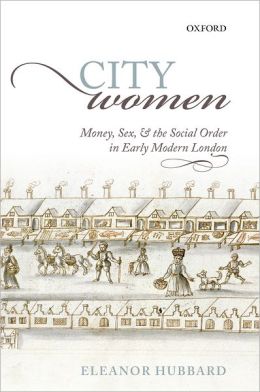
by Katherine Preston

Published by Oxford University Press, 2012 | 297 pages
Early modern England interpreted social order as originating from the household and branching outwards. The household, just as the state, was a patriarchal institution, headed by the husband, who was responsible for inspiring obedience and maintaining order. Conduct books and sermons of the period lauded female silence, chastity, and obedience as godly ideals. Then as now, however, the ideal was not necessarily coincident with the real. Scholars including Margaret Ezell, Susan D. Amussen, and Jacqueline Eales have recently begun documenting how drastically lived experience during the period diverged from prescription. Indeed, these scholars are studying the ways in which early modern women enacted agency in spite of the period’s constrictions. Eleanor Hubbard continues this trend in City Women: Money, Sex, and the Social Order in Early Modern London, privileging questions of economy in her examination of women’s contributions to early modern social order. Taking the “struggles, aspirations, and preoccupations” of ordinary women into account, Hubbard’s study looks at the opportunities and liberties that London and its economic imperatives offered. “Ordinary” here denotes the middling (Hubbard’s word) and the poor, in contrast to the elite who often dominate critical concerns but were less subject to “common” economic pressures (they were, of course, subjected to a different class of economic pressures, analyzed by others elsewhere). As Hubbard recognizes, investigating ordinary women’s lives is challenging because their own written words are relatively scarce. Confronting this challenge, she locates ordinary women’s voices in clerical, church, and judicial records. In so doing, she reassesses not only the lived experience of women of the period, but also how the archive, and scholarship, frames early modern women. Hubbard begins her study by examining the migration of young women to London in search of work (and husbands). Hubbard stresses the advantages of employment. Maidservants, in embodying loyalty, humility, and obedience, were repaid with protection and education from their master and mistress. Hubbard is inclined to gloss over the potential threats that maidservants might encounter in her effort to foreground how London boasted better options in comparison to rural communities. At the same time, as Hubbard acknowledges, maidservants were highly replaceable. In the urban center, young women learned the skills necessary to manage a household before they transitioned into running their own. The economics of courtship, which dominate City Women’s second chapter, illustrate the period’s concern with financial stability. Hubbard argues that the early modern worldview was shaped more by economic than religious influences. Urban institutions were encumbered by the failures of Londoners to support themselves and their families. Actions, and their products – “bastards” – Hubbard argues, were moralized in proportion to the degree to which they were a financial burden or advantage to the community. In the same vein, wealth was often the key determining factor in marriage arrangements. Normative values – gender and moral codes – worked in concert with economic imperatives. Behavioral ideals were enforced to directly affect order and financial stability. Hubbard boldly claims that “Early modern London women led intensely public lives.” This is in stark contrast to the dominant vein of criticism that situates women of the period as acting only within the domestic realm. Diminishing the boundaries of gendered spaces, Hubbard places women in thresholds, streets, markets, shops, and alehouses, without limning these ‘public’ presences as disruptive. In fact, she argues that order in the period depended upon female engagement in the community. Employed women, for example, were preferable in the historical moment to women—and families—that depended upon social assistance. With money as a societal priority, early modern women had both the responsibility and the opportunity to work outside of the household. Though Hubbard gestures to the potentiality for some degree of female freedom and authority during the early modern period, her study acknowledges that sustained security was ultimately unattainable for London’s ordinary women in the milieu. Women’s work was unstable, highly competitive, underpaid, and unprotected, suggesting the “fragility of the order [women] fought so fiercely to create and to protect.” Still, she urges us to recognize the integral part that ordinary women played in maintaining the order of their households, and, more broadly, their urban communities. |
Lindsay Yakimyshyn, a doctoral candidate at the University of Alberta, attends to early Stuart household theatre in her SSHRC-supported thesis work. Her recent publications include “Locating Chastity and Charity in Measure for Measure” and “‘My body joined with thine, my mouth with thine’: The Sur-vival of Robert Garnier’s Marc Antoine and Mary Sidney’s Antonie.”















click to see who
MAKE Magazine Publisher MAKE Literary Productions Managing Editor Chamandeep Bains Assistant Managing Editor and Web Editor Kenneth Guay Fiction Editor Kamilah Foreman Nonfiction Editor Jessica Anne Poetry Editor Joel Craig Intercambio Poetry Editor Daniel Borzutzky Intercambio Prose Editor Brenda Lozano Latin American Art Portfolio Editor Alejandro Almanza Pereda Reviews Editor Mark Molloy Portfolio Art Editor Sarah Kramer Creative Director Joshua Hauth, Hauthwares Webmaster Johnathan Crawford Proofreader/Copy Editor Sarah Kramer Associate Fiction Editors LC Fiore, Jim Kourlas, Kerstin Schaars Contributing Editors Kyle Beachy, Steffi Drewes, Katie Geha, Kathleen Rooney Social Media Coordinator Jennifer De Poorter
MAKE Literary Productions, NFP Co-directors, Sarah Dodson and Joel Craig